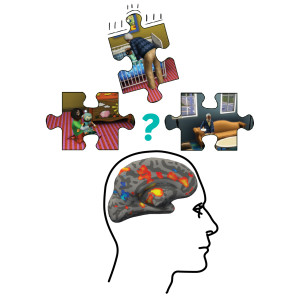We’ve all had that ‘Aha!’ moment when pieces of a puzzling problem seem to fall into place as we gain insight into a previously obscured solution. But what happens in our brains when we think ‘Aha!’? That was the question that Branka Milivojevic, Alejandro Vicente-Grabovetsky and Christian Doeller sought to answer.
Branka and her colleagues used The Sims 3 life-simulation game to make animated videos of life-like events which they showed to participants whose brain activity was monitored using an MRI scanner. They found that after people realized how some events fit together into a story, the memories of those events were joined together – just like pieces of a puzzle – to form a new memory of the entire story. This effect could be seen in the hippocampus and medial prefrontal cortex: brain regions involved in memory for personal, autobiographical, events.
This is the first time scientists have been able to visualize how the brain flexibly recombines memories of past events when new information comes to light. This research has important implications for knowledge acquisition in educational settings. It suggests that teachers can aid learning, not only by explicitly providing the context for new material as they already do, but also by pointing out links within previously learned material, thus eliciting reorganization of neural representations of knowledge and the accompanying formation of an integrated “big picture”.

Sometimes the relationship between events (the left and right puzzle pieces) is only understood once the ‘final puzzle piece’ comes to light (in the middle).


